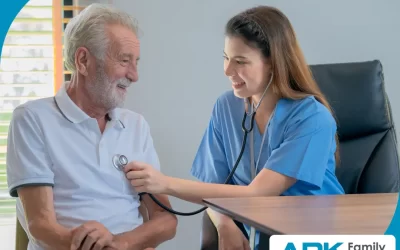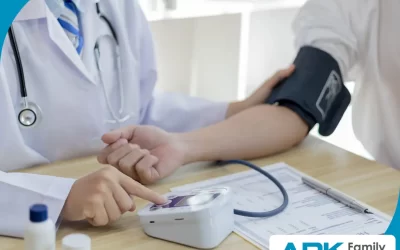In today’s fast-paced world, it’s just as important to pay attention to mental health as it is to promote good physical health. Unfortunately, common mental health issues like anxiety and depression often go unnoticed or untreated. In many cases, that is simply because people don’t recognize the signs or they feel uncomfortable seeking help.
Early intervention can make a significant difference in your health and well-being. That’s why it’s essential to understand the signs of mental health issues and recognize when it’s time to seek help from your direct primary care (DPC) doctor or other health professional.
Recognizing Common Mental Health Issues
Two of the most commonly reported mental health conditions are anxiety and depression. While everyone experiences occasional anxiety or sadness, persistent or overwhelming symptoms should not be ignored. Let’s take a closer look at how these conditions manifest:
1. Anxiety
Anxiety disorders affect millions of people worldwide. In addition, they can vary from generalized anxiety to more specific conditions like social anxiety or panic disorder. Common signs include:
- Excessive Worry: You may feel constantly worried, even about things that wouldn’t typically be a cause for concern.
- Restlessness: You may feel on edge, unable to relax, or fidget frequently.
- Physical Symptoms: Anxiety can manifest physically through symptoms like a racing heart, shortness of breath, dizziness, and muscle tension.
- Sleep Issues: Difficulty falling asleep or staying asleep because your mind won’t quiet down is another key indicator.
- Avoidance: Steering clear of situations that trigger anxiety can significantly impact your daily life.
2. Depression
Depression goes beyond feeling sad or down for a few days. It’s a persistent feeling of hopelessness that affects how you think, feel, and function in your day-to-day life. Signs include:
- Low Energy: Feeling fatigued all the time, even after a full night’s rest.
- Loss of Interest: Activities that once brought joy no longer hold any appeal.
- Irritability or Anger: Sometimes, depression manifests as irritability or even anger at minor frustrations.
- Changes in Appetite or Weight: This can be either an increase or decrease in appetite, often leading to weight fluctuations.
- Feelings of Hopelessness: Constant feelings of worthlessness, guilt, or helplessness are key indicators of depression.
Other Mental Health Red Flags
While anxiety and depression are among the most common, there are other mental health warning signs that should never be ignored:
- Frequent Mood Swings: Going from extreme highs to extreme lows can signal a mood disorder.
- Social Withdrawal: Pulling away from family, friends, or social activities you once enjoyed.
- Difficulty Concentrating: Struggling to focus on tasks or make decisions.
- Substance Abuse: Turning to alcohol or drugs as a way to cope with overwhelming emotions.
- Thoughts of Self-Harm or Suicide: This is a serious sign and requires immediate intervention from a health professional.
When to Seek Help from Your Direct Primary Care Doctor
Your direct primary care doctor is a trusted partner in your overall health, including mental well-being. Many DPC doctors are trained to recognize mental health issues and can offer comprehensive support, from diagnosis to treatment. Here’s when you should consider reaching out:
- Persistent Symptoms: If you’ve noticed any of the above symptoms for more than two weeks, it’s time to seek help.
- Difficulty Managing Symptoms: If your mental health is interfering with your ability to work, maintain relationships, or engage in daily activities, your DPC doctor can help you navigate treatment options.
- Worsening Physical Health: Anxiety and depression often manifest with physical symptoms like headaches, gastrointestinal issues, or chronic pain. If your physical health is declining without a clear cause, it may be linked to mental health.
- No Improvement Despite Self-Help: If lifestyle changes, stress reduction, or other coping mechanisms aren’t improving your symptoms, professional intervention is crucial.
How Your DPC Doctor Can Help
Direct primary care offers a unique, personalized approach to mental health. With longer appointment times and a focus on patient-centered care, your DPC doctor can:
- Provide Early Diagnosis: Catching mental health conditions early leads to better outcomes. Your doctor can assess your symptoms and guide you toward the right treatment plan.
- Offer Holistic Treatment Options: From therapy recommendations to medications, your DPC doctor can tailor treatment to meet your individual needs.
- Connect You with Specialists: If further care is required, your DPC doctor can refer you to trusted mental health professionals, including therapists and psychiatrists.
Take Control of Your Mental Health with Our DPC Providers in Peoria and Gilbert, AZ
It’s important to remember that mental health conditions are nothing to be ashamed of. With early intervention and the right care, many people can manage anxiety, depression, and other mental health issues effectively.
If you’re experiencing any of the signs mentioned above, don’t hesitate to reach out to your direct primary care doctor here at Ark Family Health. Together, we can develop a plan to restore your mental well-being.
Your mental health matters—take the first step toward improving it today!





